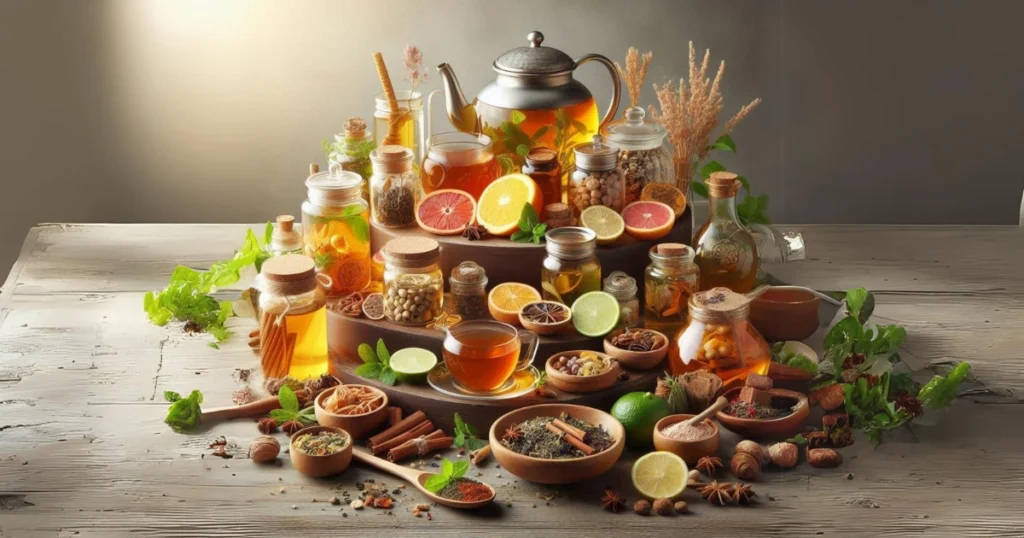
Herbal teas are constructed from dried fruits, flowers, spices, or herbs, as opposed to genuine teas, which are prepared from the leaves of the Camellia sinensis plants.
Some herbal teas possess health-promoting properties in addition to their delectable flavor. For hundreds of years, people have used herbal teas as natural remedies for a variety of maladies.
10 Healthful Herbal Teas
Below is a compilation of ten nutritious herbal beverages that you may wish to sample.
1. Peppermint tea
While most people consume peppermint tea to support digestive health, it also has antioxidant, anticancer, antimicrobial, and antiviral properties.
Numerous studies have demonstrated that preparations of peppermint oil can alleviate indigestion, nausea, stomach discomfort, and other symptoms of irritable bowel syndrome.
Nevertheless, it is uncertain whether the quantity of peppermint oil in peppermint tea has the same impact as the concentrated supplements employed in these studies. Remember this. Consequently, additional investigation is required.
2. Chamomile tea
People most commonly recognize chamomile tea for its soothing properties and frequently use it as a sleep aid.
In fact, research indicates that it has the potential to enhance the quality of sleep in postpartum women and older individuals.
Additionally, it is believed that chamomile has liver-protecting, antibacterial, and anti-inflammatory properties.
Furthermore, additional research indicates that chamomile may improve blood sugar regulation and alleviate premenstrual syndrome (PMS) symptoms.
3. Ginger tea
Ginger tea is a well-known remedy for nausea and contains a powerful dose of disease-fighting antioxidants.
Studies consistently demonstrate the effectiveness of ginger in alleviating nausea, especially during early pregnancy. However, it may also alleviate nausea induced by cancer treatments and surgery.
Furthermore, there is evidence that ginger may be beneficial in the prevention of stomach ulcers, the alleviation of indigestion, and the reduction of menstrual discomfort.
Additionally, certain studies indicate that ginger supplements may enhance lipid levels and blood sugar regulation in individuals with diabetes.
4. Hibiscus tea
Hibiscus tea possesses health benefits in addition to its distinctive flavor and vibrant hue.
Although the body of research is inconsistent, certain studies indicate that hibiscus has the potential to substantially lower blood pressure, total cholesterol, and LDL (bad) cholesterol.
Additionally, another study discovered that male soccer players experienced a substantial reduction in oxidative stress after consuming hibiscus tea extract for six weeks.
Nevertheless, it is crucial to consult with a physician prior to consuming hibiscus tea if you are currently taking diuretics, as it may interact with your medication.
5. Echinacea tea
People often use echinacea tea as a remedy to prevent and treat the common cold.
Research has demonstrated that echinacea enhances the immune system, potentially aiding in the body’s defense against infections.
Although additional research is required, certain studies have found that echinacea can reduce the severity of symptoms or abbreviate the duration of the common cold.
6. Tea with sage
Sage tea is renowned for its medicinal properties and potential advantages for mental health.
Sage has been the subject of numerous studies that have demonstrated enhancements in cognitive function in individuals with Alzheimer’s disease, despite the fact that the studies had certain constraints.
Additionally, numerous studies uncovered enhancements in memory and cognitive function among healthy individuals who consumed one of numerous varieties of sage extract.
Some studies indicate that sage may also be beneficial in reducing total and LDL (bad) cholesterol levels, although additional research is required.
7. Rooibos tea
Historically, people have used Rooibos, a herbal beverage, for medicinal purposes.
Although additional research on humans is required, a single study discovered that rooibos may possess anti-allergy properties.
Research suggests that rooibos may inhibit the formation of osteoclasts. These cells are crucial for the preservation, repair, and reshaping of your skeleton, as they are responsible for the degradation of ancient bones. People who suffer from diseases that cause excessive osteoclast production, such as osteoporosis, may benefit from inhibiting their formation.
Additionally, certain older studies indicate that rooibos tea may also have the potential to reduce cholesterol and blood pressure.
8. Lemon balm tea
Lemon balm tea appears to possess health-promoting properties and has a mild, citrus flavor.
In a relatively small study, the consumption of lemon balm tea for a period of six weeks resulted in an improvement in arterial rigidity, a risk factor for heart disease, stroke, and mental decline.
Research has also discovered that the consumption of lemon balm may enhance the body’s natural antioxidant enzymes, which are responsible for safeguarding the body from oxidative injury.
Furthermore, a review discovered that lemon balm could alleviate symptoms of anxiety and depression without causing severe adverse effects.
9. Rose hip tea
Rose hip tea is a source of vitamin C and beneficial plant compounds that possess anti-inflammatory properties.
Numerous older studies have indicated that rose hip powder may alleviate inflammation and symptoms associated with osteoarthritis and rheumatoid arthritis, such as pain.
Additionally, research has demonstrated that rose hips may be advantageous for weight management, as they may reduce body mass index (BMI) and abdominal obesity.
Nevertheless, additional human studies are required to verify the potential advantages of rose hip tea.
10. Passionflower tea
Historically, passionflower tea has been a remedy for reducing anxiety and enhancing sleep.
One study discovered that individuals with insomnia experienced an improvement in specific sleep quality indicators after consuming passionflower extract for two weeks. However, there was no statistically significant difference between the extract and a placebo.
However, additional research indicates that passionflower may be beneficial in alleviating anxiety symptoms, particularly during dental procedures.
The bottom line
Herbal beverages are naturally free of sugar and calories and come in a variety of delectable flavors.
Modern science has begun to validate some of the traditional applications of many herbal teas, which also have health-promoting effects.
Nevertheless, it is important to remember that additional research is required to fully comprehend the consequences of consuming herbal tea as opposed to extracts or other supplements.


